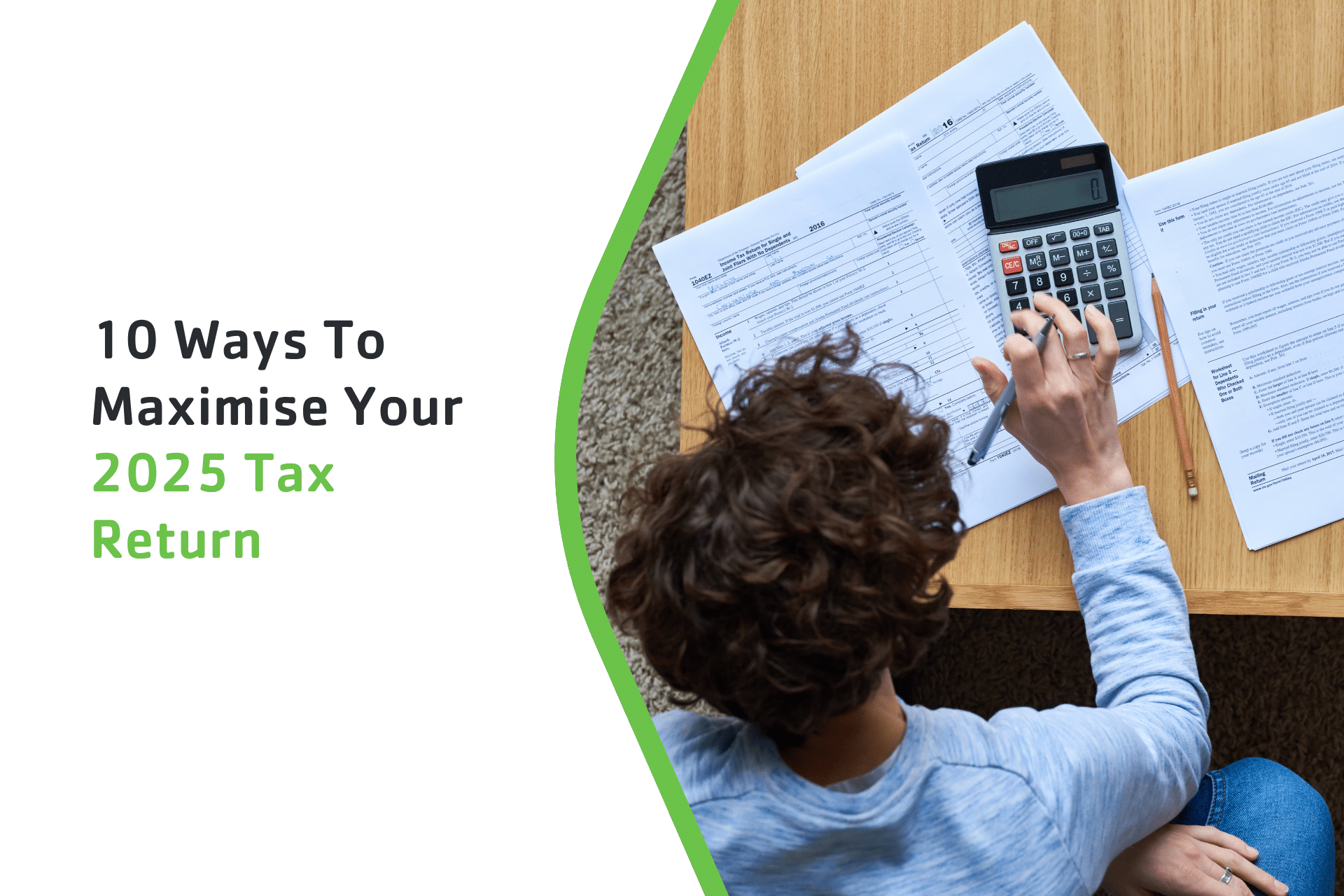Tax time isn’t just about staying compliant; it’s your opportunity to boost your financial position and take back what you’re owed. With the Stage 3 tax cuts already in place, end-of-financial-year planning remains as important as ever to make the most of your deductions and income strategy.
Here are 10 smart, ATO-compliant ways to maximise your tax return in 2025.
Table of Contents
- 1. Bring Forward Your Deductions
- 2. Defer Income Where Possible
- 3. Claim Work-Related Expenses
- 4. Rethink Your Work-From-Home Method
- 5. Max Out Your Super Contributions
- 6. Offset Capital Gains by Realising Losses
- 7. Make Tax-Deductible Charitable Donations
- 8. Repair, Don’t Renovate Your Investment Property
- 9. Get Your Records in Order
- 10. Get Expert Help
- What To Do Next
1. Bring Forward Your Deductions
Claiming deductions in the current financial year still provides great value, especially under the updated tax brackets introduced on 1 July 2024. If you have the cash flow, now’s the time to prepay expenses:
- Subscriptions or memberships
- Interest on investment loans
- Insurance premiums and rent
For small business owners, prepaying up to 12 months of eligible business expenses can significantly reduce this year’s tax bill. Remember, the expense must be incurred and paid by 30 June to be deductible this year.
2. Defer Income Where Possible
Shifting income into the next financial year can reduce your tax if you expect to fall into a lower tax bracket post 1 July. This applies particularly if:
- You’re a sole trader or consultant and can delay invoicing until July
- You’re expecting a performance bonus or commission payment
The Stage 3 tax cuts introduced in July 2024 reduced marginal rates for many Australians. This makes it more important than ever to understand your tax bracket when planning income and deductions.
Investors might also consider holding off on selling assets that will generate capital gains until after 1 July, when reduced rates could apply.
3. Claim Work-Related Expenses
Many employees miss out on deductions simply because they don’t know what they can claim or overstep the mark and get flagged by the ATO. You can typically claim:
- Tools and equipment specific to your role
- Travel between job sites (not home to work)
- Industry journals, protective gear and uniforms
Maintain receipts, record-keeping and written evidence to support your claims. Claims over $300 require receipts and must relate directly to earning income.
The ATO continues to match insurance records for high-value assets like luxury cars, art, boats and more with declared income. If you’re making significant purchases, make sure your tax records are airtight.
4. Rethink Your Work-From-Home Method
With more Aussies working remotely, the ATO has updated WFH deduction rules. You can now choose:
- The fixed-rate method: 70c/hour (for 2024–25), covering internet, phone, energy, and consumables. You can’t claim these items separately.
- The actual cost method: calculate and claim specific additional running costs (e.g. energy, internet, cleaning, stationery) based on usage and receipts.
To claim either method:
- Keep records of hours worked from home (estimates not accepted)
- Keep at least one bill or receipt for each category of expense
- Maintain receipts for depreciating assets and document their work-related usage
If you’re working in a shared space (e.g. lounge room with family watching TV), you likely can’t claim for lighting/heating costs under the actual method. Only claim the work-use portion of each cost.
On 13 April 2025, the government announced a proposed $1,000 instant tax deduction for work-related expenses that wouldn’t require receipts. If legislated, this will apply from Tax Time 2026.
5. Max Out Your Super Contributions
Voluntary super contributions are one of the most powerful tax tools available. Contribute up to $27,500 in concessional contributions (including employer super) before 30 June to:
- Reduce your taxable income
- Boost long-term retirement savings
- Potentially access the 5-year catch-up rule if your balance is under $500,000. Please enquire for more information on the 5-year catch-up concessional contributions.
Be sure to submit your Notice of Intent to your super fund to claim a deduction.
6. Offset Capital Gains by Realising Losses
Capital gains tax (CGT) applies when you sell investments for a profit. To reduce this:
- Sell underperforming or loss-making investments before 30 June
- Offset those losses against any gains realised this year
Please contact your accountant to discuss this strategy in more detail.
Be mindful of “wash sales”, the ATO tracks these and disallows deductions if you sell and repurchase the same asset within a short timeframe.
7. Make Tax-Deductible Charitable Donations
Donations over $2 to registered charities can be deducted from your taxable income. Consider:
- Making one-off or monthly donations before 30 June
- Consider donating via a public ancillary fund; this lets you claim the full deduction now, while choosing which charities to support at a later date
Keep all donation receipts on file. If you donate through payroll giving, your employer should include this on your income statement.
8. Repair, Don’t Renovate Your Investment Property
Repairs to rental properties are tax-deductible when completed before 30 June. However, improvements are not, they’re capital works and must be depreciated over several years.
- Painting, fixing leaks, or replacing broken items count as repairs
- Renovations like kitchen overhauls are improvements
Document all work and clarify the nature of the expense with your accountant to ensure full compliance.
9. Get Your Records in Order
EOFY chaos can be avoided with a little year-round discipline:
- Use apps like ReceiptHub or myDeductions to track receipts
- Set calendar reminders to upload and review records monthly
- Log WFH hours and vehicle trips as they happen
Having this information ready doesn’t just save time, it ensures you don’t miss out on deductions.
10. Get Expert Help
DIY can work for simple returns but tax gets complex quickly, and the ATO isn’t known for leniency. A registered tax professional can:
- Identify claims you might miss
- Ensure your return is audit-ready
- Save you stress and time
- Tax agent fees are deductible in next year’s return.
What To Do Next
Don’t wait until 30 June to start gathering receipts and hoping for the best.
Carbon’s Accounting & Tax specialists are here to help you plan ahead, lodge confidently and claim what you’re entitled to.






















